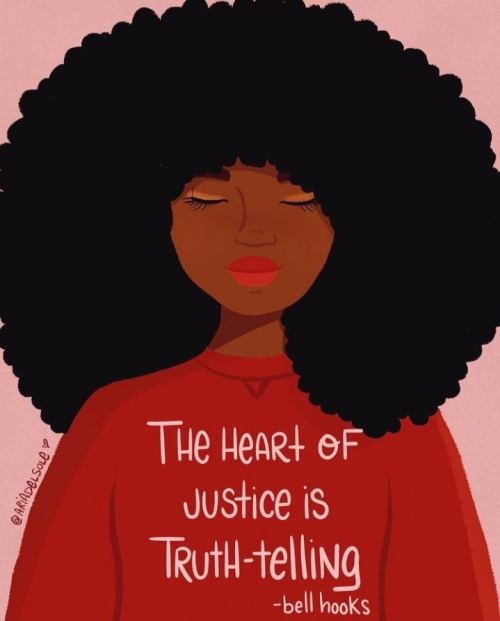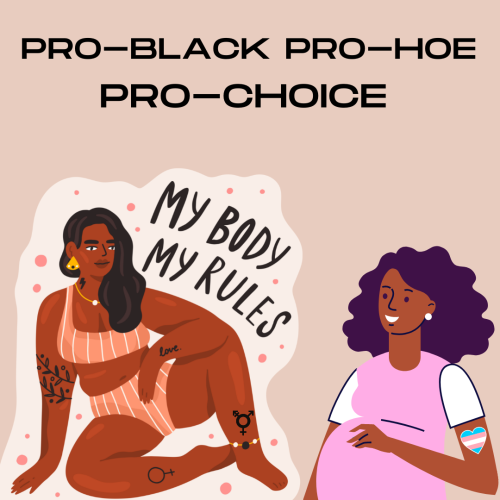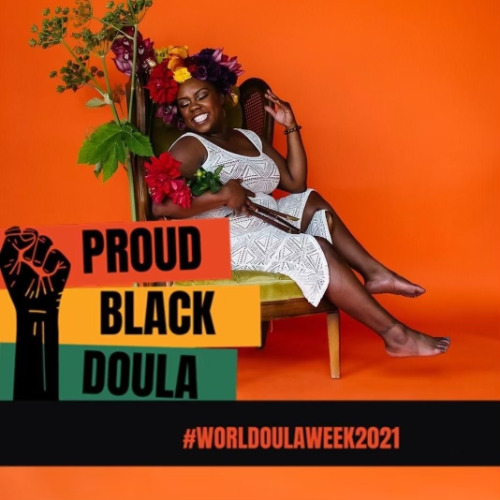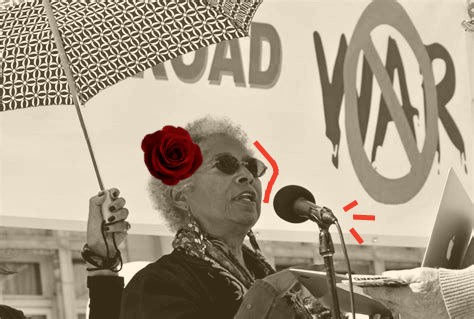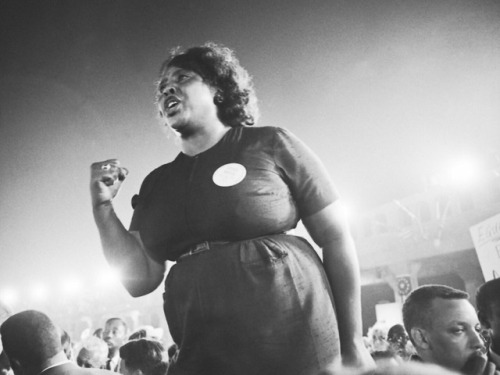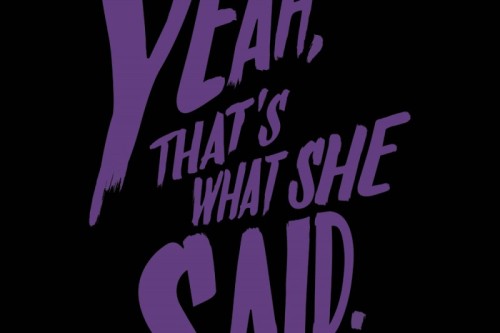#womanism
Ella Baker has really introduced me to the danger in egos. She really got it. I can’t unsee it now. I can’t unsee or unlearn the ways we put our egos on the forefront before our causes, movements, and even our people. She led and organized and taught in such a sustainable, selfless, intentional way…and we, I, need to revisit her for lessons and direction for my future.
Ms. Baker is magic revolutionarily embodied, deadass.
I’m bothered by the discussion around Amber Heard revolving around the notion that “bisexuality doesn’t justify violence”. Not because it’s untrue, but because it’s superficial.
The real issue here is that women are punished by patriarchy for being bisexual. That our bisexuality is perceived as such a threat to cishet masculinity that physical violence seems an appropriate response to it. That women’s bisexuality is a punishable crime.
This whole discussion demonstrates the power dynamics around women’s bisexuality and the depth of sapphobia (misogyny against bi women) in society. The terms of the discussion should move beyond apologetics (i.e. we don’t deserve this) and into in-depth explorations of why this violence is perceived as acceptable.
#AmberHeard
#TUN3S4D3RD3AR
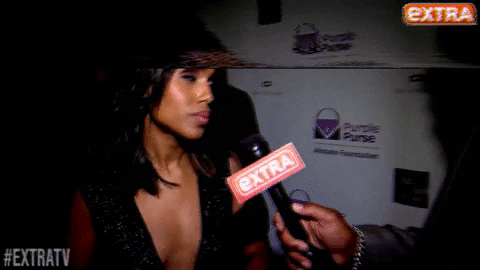
We Interrupt Our Regular Programming 4 A V.I.P Message
By Daudi Adi| April 26, 2021
What does love look like? What do justice and accountability look like? What does abolition look like? Love looks like pouring resources into community safety, community defense, and community housing. Justice and accountability look like community mutual aid, community farming, and community food security. Abolition looks like community dual power, community susu circles, and community education.
Abolitionist love and justice look like survivors having access to natural and essential resources. Abolitionist love and justice look like ensuring survivors are housed, fed, clothed, and have access to high-quality healthcare. Abolitionist love and justice look like survivors having access to healers, safe and brave spaces, safe and brave sanctuaries, and other safety structures.
In celebration of abolitionist love and justice, we are practicing (and urging readers to practice) solidarity with multiple Black survivors of capitalism, cisheteropatriarchy, racism, imperialism, colonialism, the medical industrial complex, and the prison industrial complex. As Prof. Assata Shakur (PB2D) says, when we love and support each other [by practicing solidarity with one another], we have nothing to lose but our chains.
Here are some fundraisers, programs, and structures to support.
- Support Jordan Khiry’s move and transition.
- Help Myiah’s family pay rent and other bills.
- Support the global movement to free Mumia Abu-Jamal and all political prisoners.
- Join the campaign to Bring Tomiekia Home and Free All Survivors.
- Be in solidarity with the Black Trans Lives Matter Youth Fund.
- Feed, Clothe and Support QT Naijans.
- Give a home to Harriet’s Bookshop.
- Support The Mojo Medic.
- Join the Barbara Smith Caring Circle.
- Fund Joelle’s recovery.
- Help Alicia Miller secure housing.
- Support the creation of LGBT+ Community Centers in Ghana.
- Share nutritious food with The Detroit Community Fridge.
Although my heart is heavy, I continue to find joy and hope through practicing solidarity with community members and organizing towards a liberated society. I hope these personal and communal practices bring you joy too.
Sending you love, good juju, mojo, and ase as you continue to make liberational moves in your community.
Hillary’s Baby, Donald’s Maybe? Reproductive Injustice in the Era of Electoral Politricks
“Black death and trauma remains central to the campaign of the Democratic Party. At the July 2016 Democratic National Convention, black mothers whose children had been killed by either police or white vigilantes, in the “Mothers of the Movement,” encouraged the public to vote for Clinton and thereby promoted her path for restoration and change. The assemblage of women who attested to Clinton’s “compassion and understanding to support grieving mothers” offers a profound illustration of the use of black female grief and trauma as a political strategy in solidifying Clinton’s connection to Black communities in general, and to Black women voters in particular.” - Jallicia Jolly
Post link
Via@thedejaspeaks “ Support Déjà’s Transition! Déjà is raising money to support life affirming and gender affirming treatment and care. Support her fundraiser by donating, of course, and by sharing and spreading it in your circles and wherever you go. Make posts, comment for boosting and viability through algorithms, offer services or discounts or gifts for those who donate in your name, match donations, pool money on your own and donate to others’ fundraisers.
Déjà is receiving support via GoFundMe.Com/Dejas-Transition and Venmo @TheDéjàSpeaks and PayPal.Me/DejaBaptiste and Cash.Me/$TheDéjàSpeaks
ID: Bright yellow flyer features a darkskinned Black woman smiling. She has straight black hair, wearing a white tank top, and metallic/silvery jewelry.
Text: Support! Gofundme.com/dejas-transition
Venmo@thedejaspeaks
cash.me/$thedejaspeaks”
Heri Za Kwanzaa everyone! ♡♡♡
Habari Gani? Umoja (unity), Kujichagulia (self determination), Ujima (communalist work and responsibility), Ujamaa (communalist economics), Nia (purpose), Kuumba (creativity), Imani (faith).
I’m reaching out to affirm Naomi and Katt’s story and share some truths about my experience while living at the Brick and Mortar House in Detroit, Michigan. I’m doing this in honor of the Kwanzaa principle of Nia (purpose). I believe one of my purposes is to be a truth teller.
When I started this journey, I was worried about being too outspoken, or singled out, or losing support, or labelled a troublemaker or disrupter. Now, I am able to move in alignment with my principles and purposes, despite some fears and wariness. Part of why I have grown into this person is because of the love I have received from my village.
So I’d like to dedicate this call out to my Black Ancestars, my Black spirits, my loved ones, my communities, the House of Maroon, and every Black Q.T. in struggle for our communal liberation.
♡ Thank you all so much for nurturing my growth and courage. I’m grateful for us and rooting for us always. ♡
Read more here.
Post link
Heri Za Kwanzaa to our Wominist and Black Feminist Accomplices!
We hope this message meets you surrounded by loving people, good music, and delicious food. Although this year has been deeply traumatizing, and some of our Black Feminist Gs (pb2u bell!) have transitioned into Ancestarhood, we are grateful that, despite you grief, you have stayed true to your principles of creativity, spirituality, caregiving, solidarity, communalism, and struggle for a liberated society.
We hope the spirits of Umoja (unity), Kujichagulia (self determination), Ujima (communalist work and responsibility), Ujamaa (communalist economics), Nia (purpose), Kuumba (creativity), and Imani (faith) continue to guide us throughout Kwanzaa and into the new year. Sending you MAJOR! mojo, juju, essence, chichi, love, ase, and warmth.
With Love,
The Adis
Post link
In our Womanist village, we practice self determination, and we will protect Black pregnant people’s birthright to body autonomy. We will also work towards the total abolition of entities that seek to control, criminalize, and terrorize Black people and Black communities. And that’s on what? Our Womanist Word.
Post link
Sacred Seeds Doulas are a Black Doula Collective in Colorado, who provide physical, mental, emotional, spiritual, and informational support to community members.
They are equipped to provide clients with culturally relevant, holistic care, and advocacy. The expertise of their doulas includes fertility, prenatal, labor/birth, postpartum, nutrition, energy work, lactation counseling, massage therapy, maternal mental health, bereavement, abortion, and end of life care.
They are a program within the Soul 2 Soul Sisters organization, a Womanist, Reproductive Justice organization.

“As the medical industrial complex and all authoritarian, undemocratic, institutions continue to be delegitimized, we must reclaim our power and continue to be in solidarity with Black pregnant people, Black Doulas, Black midwives, Black healers, Black rootworkers, Black herbalists, Black farmers, Black/African traditional doctors, and Black community members on the frontlines of Reproductive Justice #AbolitionNow”—Detroit Radical Childcare Collective
Be in Ujima Umoja with Sacred Seeds Doulas here.
Post link
Help WAP! House with Stability this Spring!
“WAP! House is a Black queer trans neurodivergent family of artists, abolitionists, land stewards, witchy people, & cat parents in Baltimore, Maryland. We have started this crowdfund campaign to support our household during the current spring, going into summer seasons & the beginning.” — WAP! House Statement
Learn more about WAP! House and join us in practicing Ujima Umoja with them here.
Post link
War, what is it good for? Absolutely nothing!
By Adilah Didi Adi | @AdilahDidiAdi | April 15, 2022
War against Black communities, what is it good for? Absolutely nothing!
Womanist Elder, Alice Walker, has constantly reminded us “why [white supremacist] war is never a good idea” and we should listen to our Womanist and Black Feminist Elders.
The united states government and all white western colonial capitalist governments have no legitimacy to declare war on Ferguson, Flint, Detroit, Port-au-Prince, Havana, Bamako, Lekki, Mogadishu, Johannesburg, Standing Rock, Gaza, or anywhere for that matter.
These white state and corporate officials are genocidal. They are slavocratic and sociopathic. These white politricksters and agents of white politricks are morally bankrupt and have no moral authority to hold anyone accountable.
Any civilian who legitimizes white supremacy, white supremacists, agents of white supremacy, and white supremacist violence against any civilians, does so at their own peril. When white terrorism disposes of us today, white terrorism will dispose of you tomorrow.
And that is why I say no power to the state or corporate and all power to the people!
#AbolitionNow #DefundToAbolish
Source
- Photo: Elder Alice Walker. Alice Walker’s Garden, “Alice Walker at a US-Syria-War Protest in Oakland, CA.” (2018)
- Video: Ancestar Edwin Star , “War (Live At Soul Train).”
Post link
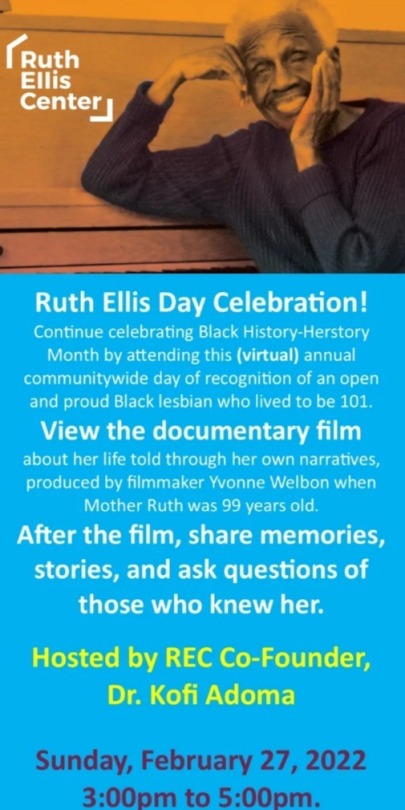
Today 2/27/22 is a v beautiful Sunday for us because we get to celebrate both Ruth Ellis and our many Black Ancestars/Spirits .
We are excited to get our lives at the 7th Annual Black QTNB Healing Circle and the Ruth Ellis Day Virtual Celebration 2022 .
This is a great way to close out Black Ancestory Month as we transition into Black Women Herstory Month
We look forward to seeing the other attendees at the celebrations
✌Sending all my Black Baddee Bs major good Mojo, Juju, Chichi, (BB—Blessings on Blessings), and Essence ✌

“If I fall, I will fall five-feet four-inches forward in the fight for freedom.” Civil Rights icon Fannie Lou Hamer died on this day in 1977
Post link
❌Ascension is political ❌
Celebrating Latinas in the Arts
Denton TX – In celebration of Mexican culture on the weekend of Cinco de Mayo, Muchacha Fanzine and The Wounded Healer’s Collective, proudly presents Denton’s first Latina artist showcase “Brown Queen: Our Voz Our Arte” on Cinco de Mayo located in downtown Denton. This cultural celebration is intended to honor, celebrate, and support the cultural contributions and talents of rising local Latina artists. We hope this event can serve to bring attention to Latin@/Hispanic culture and women of color contributions within the artistic community of Denton and the larger DFW metroplex.
Brown Queen: Our Voz Our Arte is brought to you by one of the organizers of the Denton Annual Femme fest, Muchacha Fanzine, a local Latina feminist zine and The Wounded Healer’s Collective, an initiative comprised primarily of local women of color artists, graduate students, and staff from Texas Woman’s University who promote art as a tool for community building and development. This event will include spoken word poetry, comedy, dance, diverse musical performances, food, as well as a visual art auction open to the public. This event will also premiere Muchacha Fanzine’s newest issue “Brown Queen” which includes diverse submissions of poetry, short stories, and visual art by Latina artists around the world.
We invite local businesses, organizations, media sources and YOU to consider being involved in the conservation and creation of culture through the arts by donating to our KICKSTARTER EVENT PAGE. All donations will be used towards event costs. All proceeds of this event will also be donated to the participating local Latina artists as a statement of appreciation, support, and solidarity in the continued nurturance and development of Latina’s in the arts.
For any further information please contact Daisy Salinas at [email protected] and Erica GDLR at [email protected] .edu o
Post link
Happy #InternationalWomensDay! Today like every day I’m celebrating those who fight day in and day out to have every ounce of their womanhood respected. For the trans women. For the Black women. For the queer women. For my mother and grandmothers and sisters and homegirls. For the women who can’t take off for #DayWithoutAWoman. For women of every experience. We run this.
Post link
“Yeah, That’s What She Said” is a weekend-long space of collectively self-organized sliding scale arts programming and community events by and for women.
Last year we launched “Yeah, That’s What She Said!”, a collectively self-organized women-lead event. Over three days in March, 300+ people came together for an all women’s art show, public events, screenings, and women-only workshops. Through community support, we were able to raise just enough money to pull it all off, and fostered impactful, lasting connections amongst radical women artists, organizers, makers and minds.
This year, in addition to our overall mission, we are centering work and programming that focuses on: BLACK, BROWN AND TRANS WOMEN’S LIVES MATTER. Our curatorial team will be looking particularly for work from black, brown and trans women.
There will be by-donation events that are open to the entire public, as well as sliding-scale workshops that are exclusively women’s spaces. (Although we are taking sliding scale at the door, we want everyone to be able to come, so NO ONE is turned away!)
This is a super valuable event to support. They are still a ways out from reaching their fundraising goal.
Click here to support their campaign to fundraise this weekend of events.
Click here to check out the events’ Facebook page.
Post link
(viahttps://www.youtube.com/watch?v=h4tOUF_BJPE)
TW: Rape, violence, police abuse and murder
This is important. PLEASE WATCH & SHARE THIS. This is an interview we conducted with Baltimore Black Panther and community leader Reverend Annie Chambers about the murder of her grandchildren by the police, and the long history of violence against Black people in Baltimore.
This interview was conducted back in 2012. I blame myself for the video cutting out after 47 minutes. The camera died and I didn’t have replacement batteries. Someone in the Baltimore area should reach out and follow up with Reverend Chambers if possible.
What we’re seeing in Baltimore today is the culmination of years decades centuries of continuous violence and oppression against Black people at the hands of police and White supremacy.
Janet Mock: The deaths of 6 trans women in the U.S. in 2015
February 17, 2015
This morning I read about the murder of Bri Golec in Ohio. She was stabbed to death by her father. She was only 22 years old. Her death marks the sixth trans woman to be reported murdered in the U.S. in 2015. It’s not even March.
The other five women are*:
–Lamia Beard, 30, Norfolk, VA
–Taja DeJeus, 36, San Francisco, CA
–Penny Proud, 21, New Orleans, LA
–Ty Underwood, 24, North Tyler, TX
–Yazmin Vash Payne, 33, Los Angeles, CA
As the New York City Anti-Violence Project noted in their tweet about Golec’s murder, “This time in 2014 we knew of no homicides of Trans women in the US. As of now there are AT LEAST SIX.”
This time in 2014, just a year ago, Laverne Cox and Carmen Carrera had publicly challenged Katie Couric; I sparred about language and identity on CNN; Cox’s Netflix series Orange Is the New Blackwas preparing for its second season; and my memoir had landed on the New York Times bestsellers list. This was the highest media saturation for trans women of color in U.S. history. As a writer and journalist, I had been forecasting the game-changing moment that was soon to come in May: Cox, a black trans woman from Mobile, Alabama, appearing on the cover of Time magazine.
After decades of erasure, trans women of color were finally garnering mainstream attention. Cox used her time in the pop cultural spotlight to not only advance her acting career, but to tell the stories of women like CeCe McDonald. We both stood behind Monica Jones as she resisted police profiling in Phoenix, Arizona, and trans Latina teen Jane Doe as she was unlawfully held in an adult prison.
Personally, I know that my visibility has to be more than just about my own pursuits. When I walk into a space, I am cognizant of the fact that I am bringing communities of people with me, communities that have historically been exiled and silenced. The weight of that responsibility never lightens, even as Inavigate uncharted terrain as a TV host. My show So POPular! explores the intersection of popular culture, representation, politics, identity and community. Though it doesn’t explicitly cover trans issues, it’s a space created and fronted by a trans woman of color, so the lens to which I explore topics on my show is that of a trans person, a black person, a woman of color. My goal is to take the focus away from myself as a subject, and instead be the person asking the questions, shaping the conversation.
I’ve seen folks juxtapose the recent media visibility of trans women of color and these recent murders. I’ve read sentences to the effect of: “At a time when trans women of color have visibility, we still see trans women murdered.” I find this logic to be quite basic.
Yes, trans women are being murdered. Yes, trans women of color have gained mainstream visibility. But trans women, particularly those of color, have always been targeted with violence. The differences now? There are some systems in place that better report violence and there is finally visibility of a select few that helps challenge the media’s framing of these women’s lives.
But cultural representation is just one piece of the social justice pie, and we must be clear about one thing: Trans women of color have had one year of visibility in the media, after decades of erasure (think about how many times historians, archivists, filmmakers or books mention the revolutionary work ofSylvia Rivera, Marsha P. Johnson or Miss Major Griffin-Gracy). It’ll take more than a year of a few trans women in media to transform decades of structural oppression and violence, decades of misinformation, decades of exiling.
We are not existing in a fairytale where the very recent successes of a few individuals — whether that’s Laverne or Carmen or me — could quickly and radically transform the lives of our sisters who are resisting in already struggling communities, who are navigating poverty, homelessness, and joblessness while also facing high medical and educational costs, police profiling and incarceration as well as HIV/AIDS, the risks of underground economies as well as the looming threat and reminders of violence.
WhenI appeared on Real Time with Bill Maher last week, I mentioned the violence that trans women, particularly those from low-income and/or people of color communities face, during the show’s “Overtime” segment.
“There is a lot of violence, right?” Maher asked
I nodded and responded: “So much of it is linked to the idea that women are not valued, people of color are not valued and trans people are often invalidated in our society. So when you throw that all into one person’s body, there’s a lot of targeting that comes into that space. We need to have a national outrage over these bodies that no one is protecting.”
Maher then said, “I thought, and maybe I’m wrong, that the violence came because the transgender person didn’t tell the guy about their past and then the guy kissed her or something and then found out. And he’s like, ‘Oh now, I’m a homo.”
I challenged Maher by telling him that trans women are not being targeted solely because men find themselves attracted to us. No woman deserves violence. Period. We do not exist to “trick” or “deceive” men into sleeping with us. Trans women are targeted because we exist at vulnerable intersections of race, gender and class. My sisters are vulnerable because no one movement has ever centered the bodies, lives and experiences of these women, except for the severely underfunded, largely volunteer-staffed work of organizations run by and for our communities (from TGIJP,Casa Ruby,TransLatina Coalition,Sylvia Rivera Law Project,TWOCC,TransJustice, to name a few).
Trans women of color dangerously fall in between the cracks of racial justice, feminist and LGbt movements.
Our visibility at this particular moment in culture is helping reshape the narrative of trans women’s lives, it’s helping those who may not know a trans person get familiar with the lives and struggles of trans people, it’s helping push media gatekeepers to report on our lives with a more just and true lens (though it still seems to be struggling when it comes to Bruce Jenner’s alleged transition). What we can’t expect this visibility to do is cure our society of its longstanding prejudice, miseducation and myths surrounding trans women.
Even on the most liberal shows, trans women are still often punch lines (see any lazy joke targeting Jenner’s femininity and body). Even in our moment in the media spotlight, one fallen white trans bodygarners mainstream headlines over the consistent murders of those that are black and brown. Even in movements organizing against violence against women or black and brown bodies, trans women of color’s bodies are not prone to mass mobilization and I watch as my sisters and siblings speak with one another about protecting trans bodies with hashtags #blacktranslivesmatterand#translivesmatter.
I point out these disparities in an effort to better frame this moment we’re existing in, as someone who has been privileged with access to visibility, as someone who grew up with little access to mirrors that represented me. I am humbled that I can be one such mirror for girls growing up like I did. Representation is an affirming start, but it’s not everything.
There’s much we should be applauding, yet as we applaud, we must also be aware of those women existing outside of the media’s narrow lens, the women organizing, the women on the streets hustling, the women rejected from shelters and improperly placed in men’s detention and prison facilities, the women volunteering their limited resources to support communities of trans folk who’ve been overwhelming neglected by movements.
The names of our sisters shouldn’t only make headlines when we walk a red carpet or lay in a casket. Our visibility shouldn’t be subject to such extreme circumstances. We’ve grown too accustomed, in the past year, to speaking the names of Laverne Cox and Janet Mock, and giving ourselves social justice cred for doing so. This is dangerously tokenizing and speaks to the hypervisibility of women of color who are expected to not only carry their dreams but the dreams of an entire race and people with them.
It’s part of the reason why I am weary of amplifying these women’s deaths because it often feels like these women’s names are only spoken by the majority of us when they can no longer respond. But I must speak their names and when I do, I am aware that my sisters do not need to be reminded of their vulnerability and the threat of violence that looms over their lives.
Post link



